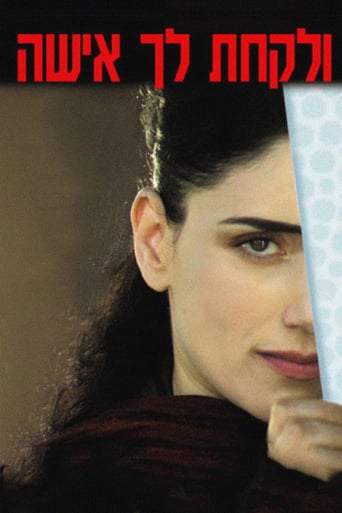aphrodisiaciix
The movie is well directed and well acted with interesting/engaging characters (even down to the supporting cast, i.e. the grandmother). The subject of family relationships between husband and wife, mother and children, father and children... sprinkle in neighbors, past lover, religious customs, and self-desires... Voila! a mundane life story becomes surprisingly appealing and absorbing. We all can relate to the characters since they are someone we have definitely have seen or experienced through in our own life. Some can even easily see themselves and their life through these characters. This movie is definitely worth the time and recommended for mature audiences.
ReganRebecca
I completely fell in love with Elkabetz's final film Gett: The Trial of Viviane Amsalem. It's such a complete film I didn't realize until much later that it was the final piece in a trilogy, the first being To Take a Wife. To Take a Wife works much the same way. You don't need to know that it is part of a trilogy, it works very well on its own. Ronit Elkabetz plays Viviane Amsalem. When we meet her she is completely silent, and remains so for a good portion of the running time. Men around her beg and plead with her. It's because Vivane wants a divorce from her husband, and her ultra religious family are appalled and want her to give her husband a chance. The scene ends with Viviane relenting, but the rest of the movie is preoccupied with showing just how bad the Amsalem's marriage is. In Gett, Viviane talked about the torture of their marriage, but it was never seen. In To Take a Wife, we learn just how bad things can get between two people who are completely ill suited to one another. This is the debut film for Elkabetz and her brother and co-director. Unlike Gett this doesn't rise to the level of full masterpiece but it's an excellent showcase for Ronit nevertheless and her portrayal of Viviane is heartbreaking and feels real and lived-in.
aFrenchparadox
I think somewhat what we see in movies depends on what we want to see and on what concerns us at the particular moment of our lives we see them. In the case of "To take a wife", I remember particularly having been struck by how social pressure can be high on how you live your private life, depending on the culture in which you live. I cannot remember if I saw "L'esquive" right before or right after this one, but it is definitely the combination of both which left me with this feeling, and helped me to define a bit more what I want for my private life, or in this case, what I don't want for it (i.e. that my community has anything to say about it). This thematic makes this film particularly universal for a very culturally contextualized one.
Omri Alon
Ronit Elkabetz has a tendency for extravagant characters and in this film portrays yet another. Her loveless marriage in shambles, her old lover back in Israel, she stumbles from one situation to the next as if under no power of her own. Her husband, her children, her neighbors, her lover -- they all seem more like obstacles in her path toward self-actualization than characters she feels anything for.The narrative is awkward and confused, the characters seem to lack any particular drive, but it still all kind of pulls together because of the emotional immediacy created by explosive bursts from various characters well-captured by the camera in close-up.While I can't say I thought it was a very good film, it's definitely interesting. If Shlomi and Ronit Elkabetz can tighten up their storytelling, their next work should be truly unique.




